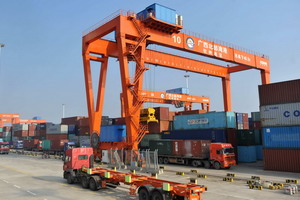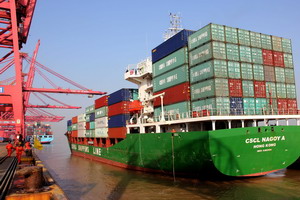Premier Li Keqiang pledged to cut red tape in customs clearances to help businesses during a fact-finding trip to a major port in northern China on Thursday.
"Streamlining customs procedures can cut costs for trading companies, and promote imports and exports. A convenient and free trading environment will make our country more competitive on the global market," Li said during a trip to Tianjin Xingang Customs in Binhai New Area.
Tianjin Xingang Customs, a pilot project set up in July to test integrated customs clearance reforms, shows promise. It has streamlined clearances for Beijing, Tianjin and nearby Hebei province.
Under the test, one customs clearance center manages information for all three places and oversees the movement of goods between them.
 |
 |
Under the pilot, companies can choose any customs department and, once cleared, do not need to be inspected elsewhere in the region.
SMC Corp, a leading Beijing manufacturer of pneumatic devices, for example, once had to apply for a customs clearance to import components at Tianjin's port, and then apply for another clearance from Tianjin to Beijing. The extra step has been eliminated under the streamlining effort.
The integrated customs clearance now requires only three or four days, compared with a week in the past, according to Tianjin Xingang Customs.
China's General Administration of Customs said that Tianjin's trial can be introduced to other places, such as the Yangtze and Pearl River deltas, if it proves to be successful.
Zhuang Jian, a senior economist at the Asian Development Bank, said the integrated clearance process will help boost the economic development of central and western China, where exporting is constrained by geographic difficulties.
"This will eliminate obstacles for these regions to develop foreign trade by simplifying the procedures and lowering the cost. It will help realize the potential of competitive products and, in turn, narrow the gap between inland China and the eastern and coastal regions," Zhuang said.
China's imports and exports expanded 3.9 percent in August. Its trade surplus hit a record high of 77.8 percent year-on-year, as improved external demand fueled exports, while weak domestic investment and falling commodity prices continued to affect imports. Ren Baiming, a researcher at the Ministry of Commerce, said it is very unlikely that China will meet its annual trade target of 7.5 percent this year.
Zhuang, the economist, said the relatively weak import figures show that domestic demand in China is not as strong as it used to be.
"The investment demand has especially weakened," he said. "July statistics show that the growth of investment has slowed down. This, in turn, weakened import trade."
The trade surplus, if continued, will impose appreciation pressure on the renminbi, he said, though he thought the weak import picture would not last long.
"The Chinese government has issued a number of policies to guarantee growth, including strengthening financial support to small and micro-businesses, agriculture, emerging industries and private companies. They are different from the policies before, which focused on strong short-term stimulus," he said. "The government also attaches great importance to improving people's livelihoods. The imports will rise if the country's domestic demand, especially its consumer demand, rises."
